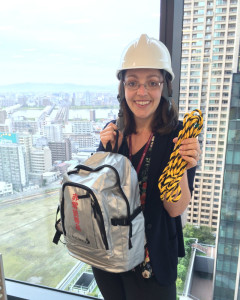My ‘usual’ job is in HR at a manufacturing plant in Sydney with AstraZeneca, but when I was given the opportunity to participate in a professional exchange in Osaka, Japan, I jumped at the chance. As soon as I boarded the plane at Sydney airport, I knew I was going on an adventure, and it wasn’t just the three Japanese Airline staff who lined up beside the plane to bow and wave as the plane taxied out of the gate. This exchange was with the HRBP of our Japan Operations team and gave me the fantastic opportunity to immerse myself in the Japanese way of life in Osaka by living and working there for five weeks.
I have holidayed in Japan before, so I was familiar with the culture and thought I knew what to expect. What I quickly learned was that holidaying somewhere and living there, even temporarily, requires an entirely different mindset. Things that are overlooked, trivial, interesting and exciting while on holiday can become apparent, overwhelming and maybe not quite as exciting when you’re semi-permanent and attempting to settle.
Osaka is a mix of ancient and modern: a city where pachinko halls sit alongside traditional Japanese bath houses, both right around the corner from a department store basement filled with some of the most confusing and enticing food I’ve ever seen.
The changes go beyond the obvious, though, which is something I learned once I started work. While things have begun to change in Japan, many of the old workplace traditions still hold true. It was not so long ago that promotions and salary increases were awarded based on age and tenure, not performance.
Young employees are more likely to change companies, challenge decisions and understand the concept of pay for performance. In comparison, older employees are stick with traditional Japanese business customs, and they are less likely to job hop – it wasn’t unusual to meet someone who had been working in the same role for more than 20 years. These two approaches add an additional element of complexity when attempting to evolve company culture and engage employees across all generations.
Japan is undergoing the same social transformation faced by most of the western world, where life expectancy is increasing and the workforce is ageing. As such, businesses and HR professionals there face many of the same challenges as their Australian counterparts. I learned a lot in my short time in Japan, and if you are thinking about working in HR there, here are some things to keep in mind:
- Immigration is difficult, so look for international companies that can assist you.
- The Japan HR society has a page in English and some useful insights into Japanese HR practices.
- Learn some of the language! I didn’t have the time to do this before I arrived in Japan, but I am sure it would make life easier (especially supermarket shopping).
- If you have not worked in Asia before, then be prepared for a culture shock. However, being curious and asking questions will help you find a comfortable place somewhere between both cultures.
- Research common Japanese customs. Even as a foreigner you will be expected to adhere to social customs: take your shoes off when you enter someone’s house; don’t talk on the phone on the train (texting, playing games or being on social media is fine); and use both hands when passing your business card to a new acquaintance.
- Japan has a long history of patriarcy, and so the gender norms are different to ours. Although they are slowly changing, I was taken aback on more than one occasion by young women telling me they have no interest in developing their career, as management is ‘not something women are good at’. If you are a champion of female leadership, be prepared to face this difference and remember to take several deep breaths before responding.
- Be patient – patient with yourself, patient with others and patient with the culture. Remember that life is a journey, so appreciate and embrace the differences while you can.
At the end of the day, people are still people, and the HR plan and strategy is similar in both countries. For me the differences lie in the execution and communication of this strategy. If you get a chance to work in Japan, then I would highly recommend you embrace the opportunity and make the most of it – if for nothing else then experiencing the dizzying, enticing experience of a department store food hall.
*All opinions and views are those of the author.

